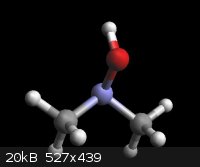Eddygp
National Hazard
   
Posts: 858
Registered: 31-3-2012
Location: University of York, UK
Member Is Offline
Mood: Organometallic
|
|
Substituting hydrogens in hydroxylamine
I had been thinking for a while about hydroxylamine, NH2OH, and about the possibility of substituting the amine's hydrogens (not the
hydroxyl one) by any R group. This would yield things like N(CH3)2OH or, in general, NRR'(OH). EDIT: Not ketoximes, because I
don't want to use that carbon double bond to the nitrogen!!
I would like to see if it would be easy to do so from scratch, or with techniques available to home chemists (that is, not using a palladium catalyst
heated up at 820K under 2.3 atm of pressure).
Just curious about it.
EDIT: Uploaded an image of a possible compound:
[Edited on 15-9-2013 by Eddygp]

there may be bugs in gfind
[ˌɛdidʒiˈpiː] IPA pronunciation for my Username |
|
|
AndersHoveland
Hazard to Other Members, due to repeated speculation and posting of untested highly dangerous procedures!
    
Posts: 1986
Registered: 2-3-2011
Member Is Offline
Mood: No Mood
|
|
I have previously been thinking about the easiest routes to N,N-dimethyl hydroxylamine, because I think it could form very stable and very powerful
explosive salts (particularly the nitroformate).
Would bromomethane add methyl groups to hydroxylamine? If the hydroxyl group got methylated, could that not just afterwards be hydrolyzed off with
acid?
Typically the routes to hydroxylamine derivatives do not start with hydroxylamine.
One lab preparation I saw was oxidation of N,N-dimethyl-cyclohexylmethylamine with H2O2 to the N-oxide, then pyrolysis at 160 C, releasing the
dimethylhydroxylamine, and leaving an unsaturated methylenecyclohexane.
|
|
|
Eddygp
National Hazard
   
Posts: 858
Registered: 31-3-2012
Location: University of York, UK
Member Is Offline
Mood: Organometallic
|
|
Beg my scarce and sparse knowledge, but I think that the bromomethane would probably alkylate the hydroxyl group instead.
there may be bugs in gfind
[ˌɛdidʒiˈpiː] IPA pronunciation for my Username |
|
|
DraconicAcid
International Hazard
    
Posts: 4278
Registered: 1-2-2013
Location: The tiniest college campus ever....
Member Is Offline
Mood: Semi-victorious.
|
|
Quote: Originally posted by Eddygp  | | Beg my scarce and sparse knowledge, but I think that the bromomethane would probably alkylate the hydroxyl group instead. |
Not sure about that- nitrogen tends to be a better nucleophile than oxygen.
Please remember: "Filtrate" is not a verb.
Write up your lab reports the way your instructor wants them, not the way your ex-instructor wants them.
|
|
|
Eddygp
National Hazard
   
Posts: 858
Registered: 31-3-2012
Location: University of York, UK
Member Is Offline
Mood: Organometallic
|
|
Oh, my bad! That is true, DraconicAcid! However, it might not react evenly giving either N,N-dimethylhydroxylamine or N-methylhydroxylamine... even
with stoichiometric proportions it would reach at a certain point an equilibrium. A catalyst or a temp. change would be needed then, drawing the
equilibrium to the product. After that something should be added to react with the hydroxylamine but not with the product.
there may be bugs in gfind
[ˌɛdidʒiˈpiː] IPA pronunciation for my Username |
|
|